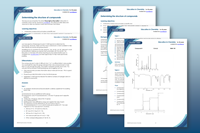Examine data relating to the structure and complexity of compounds, including mass, infrared and 1H NMR spectra
This resource accompanies the article How to teach spectroscopy at post-16 in Education in Chemistry, which provides ideas and resources to help your learners master spectroscopic techniques.
Providing concrete examples to your learners helps them make real-world connections to the content they learn in the classroom. Analytical chemistry’s uses in sport and anti-doping can be an engaging hook for your lessons on spectroscopy and structure determination. Inspire your post-16 learners with interesting chemistry careers, such as Nicola’s role as an assistant analyst at a drug control centre, too.
-

Download this
Scenario and spectra practice, for age range 16–18
Give your learners a concrete analytical chemistry example and seven compounds' spectra to interpret.
Download the student worksheet as MS Word or pdf and the teacher notes, including answers, as MS Word or pdf.
View and download more Lesson plans
In this resource, learners also encounter mass spectrometry, infrared (IR) and 1H NMR spectroscopy. They are provided with data for seven different compounds of increasing complexity to practise interpreting spectra.
These activities will sit well within a series on structure determination. Learners will need to have been introduced to the three basic techniques and have some knowledge of organic chemistry. The activities could be presented as a revision guide as well as being used to support the development of understanding.
Learning objectives
- Understand, analyse and summarise a scientific text.
- Know that a combination of data from instrumental analysis is required to determine the structure of a compound.
- Determine the structure of compounds by analysing data from mass spectrometry (MS), infrared (IR) and 1 H nuclear magnetic resonance (NMR) spectroscopy.
How to use this resource
Task 1 provides the opportunity for information analysis and comprehension. Learners will read background information on nandrolone, an anabolic steroid. They will need to synthesise, share and query ideas in answering the questions and writing the summary to athletes and their national governing bodies. The summaries will indicate if they have understood the key points. Use the discussion on banned substances based on your learners’ advice to develop their communication, listening and peer assessment skills. Challenge your learners to think of additional techniques that may help resolve drug testing cases.
More resources
- Watch this practical video with your 16–18 learners to link structure determination and testing for organic functional groups.
- Highlight a possible career pathway in analytical chemistry with this job profile from Christopher, an NMR spectroscopist.
- Use this Starter for 10 on analysis to revise mass spectrometry, isotopic abundance, infrared spectroscopy and more.
- Show your learners this collection of videos on a range of spectroscopic techniques for pre-lesson tasks or consolidation after teaching new theory.
Introduce the second task by making links between the information on nandrolone and the techniques used to determine the structure of compounds. The task requires the synthesis of complex data and is a great opportunity for you to provide groups or individuals with formative assessment and feedback. Explain to learners that they will use mass, IR and 1H NMR spectra to determine the compounds’ structures. Make sure they have a data book or sheet available to help them identify key bonds and groups present.
Modelling how to complete the task using the ‘I do, we do, you do’ approach could be beneficial in helping your learners feel comfortable with the activity. The Education in Chemistry CPD article Teaching structure determination post-16 provides logical steps to help make spectra less puzzling.
Differentiation
The compounds are in order of difficulty from 1 to 7, so differentiation is also possible. You could split the class into groups and give them one compound each or task them to work through the series. The student worksheet includes some clues. You can give further prompts if individuals/groups are struggling, such as:
- Mass spectrometry provides information about molecular formula – this is a good starting point.
- IR spectra provide information on key functional groups.
- Integrated 1H NMR spectra indicate the relative numbers of hydrogen atoms in different environments.
Downloads
Determining the structure of compounds student worksheet
Editable handout | Word, Size 1.05 mbDetermining the structure of compounds teacher notes
Editable handout | Word, Size 0.45 mbDetermining the structure of compounds student worksheet
Handout | PDF, Size 0.59 mbDetermining the structure of compounds teacher notes
Handout | PDF, Size 0.24 mb
Additional information
This lesson plan was originally part of the Assessment for Learning website, published in 2008.
Assessment for Learning is an effective way of actively involving students in their learning. Each session plan comes with suggestions about how to organise activities and worksheets that may be used with learners.
Resource updated in 2023. Task 2 answers provided by Catherine Smith.


















No comments yet